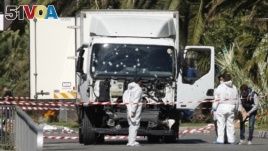20 July, 2016
Leaders of the al-Qaida and Islamic State terrorist groups have been urging followers in Western nations to carry out attacks with whatever weapon is available -- including a knife, a car or a fist.
This month, Mohammed Bouhlel showed how deadly simple attack methods can be. He killed 84 people in the French port city of Nice with a truck.
Daniel Benjamin was a counterterrorism official at the U.S. State Department. He is now the director of the John Sloan Dickey Center for International Understanding at Dartmouth College.

Investigators near the heavy truck that ran into a crowd at high speed, killing 84 people who were celebrating the Bastille Day, July 14 national holiday on the Promenade des Anglais in Nice, France, July 15, 2016.
"It's a frightening moment," he said. "How many easy and simple ways can we identify to kill people?"
Vehicles as weapons
Terrorists have begun using vehicles as weapons for several years. So-called car-ramming assaults by Palestinian militants have killed many people in Israel.
Vehicles have also been used in a series of smaller attacks in France, Britain, Canada and the United States.
In 2006, Iranian-American Mohammed Reza Taheri-azar drove his car into a group of students at the University of North Carolina. Nine people were hurt.
The attack in Nice was unusual, however, because of the size of the vehicle and the size of the crowd.
Scott Stewart is the vice president of tactical analysis at the intelligence advisory company Stratfor. He told VOA on Skype that "what's kind of unusual about this [Nice] attack is that such a large vehicle was used against such a large crowd; you had such a huge death toll."
Low-tech methods
It was likely easy for Mohammed Bouhlel to find information about how to carry out his attack. In 2010 al-Qaida began urging its followers to use vehicles to kill what it called "the enemies of Allah."
And in January, 2015, IS spokesman Mohammad al-Adnani urged supporters of the group to kill Westerners with whatever means available -- "whether an explosive device, a bullet, a knife, a car, a rock or even a boot or a fist."
His words have been effective.
In June, Larossi Abballa, a 25-year-old Frenchman and former recruiter for a terrorist group, used a knife to stab a police officer and another person near Paris. And this week, a 17-year-old Afghan asylum-seeker used an axe and a knife to attack people on a train in Germany. At least five people were injured before the teen was shot dead by police.
One reason that militants are turning to low-tech methods is because Western officials have improved their ability to stop large and complex attacks.
But American intelligence and law enforcement agencies have long feared a low-tech attack such as that which happened in Nice. They admit it is difficult to defend against such an attack.
Colin Clarke is a political scientist at the Rand Corporation, a research group. He asked: "What are you going to do? Take people's cars away?"
Security barriers and large trucks carrying loads of sand are used to protect government buildings in the United States. Scott Stewart of the Stratfor company says officials are "going to consider using those sorts of things or large vehicles to block streets during large events in the future."
Michael Rubin is a former official of the U.S. Department of Defense. He now works at the American Enterprise Institute, a research group in Washington.
He notes that the United States has many so-called "soft targets." He says because terrorists have begun to use simple methods, the country needs to think in different ways about how to defend against terrorist attacks. Rubin told VOA "we're very good at preventing the last terrorist attack. We're not forward thinking."
In a blog post last week, he disagreed that some attackers work on their own. These attackers are often called "lone wolves." Rubin said many of them are supported by terrorist groups online and may have been radicalized over the internet.
"Every lone wolf now has a pack behind them," he wrote.
I'm Jonathan Evans.
Masood Farivar reported this story. VOA's Jeff Seldin contributed to this report. Christopher Jones-Cruise adapted it for Learning English. Kelly Jean Kelly was the editor.
We want to hear from you. Write to us in the Comments Section, or visit our 51VOA.COM.
_______________________________________________________________
Words in This Story
ram – v. to forcefully hit something
pack – n. a group of usually wild animals that hunt together